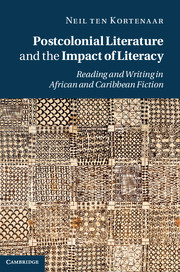 Postcolonial Literature and the Impact of Literacy
Postcolonial Literature and the Impact of Literacy Book contents
- Frontmatter
- Contents
- Acknowledgements
- 1 Introduction
- 2 The coming of literacy: Arrow of God by Chinua Achebe
- 3 The contents of the tin trunk: Ìsarà by Wole Soyinka
- 4 Mr Biswas finds a home in the world on paper: V. S. Naipaul
- 5 Literacy in the world not ruled by paper: Myal by Erna Brodber
- 6 Southern Africa's Houses of Hunger
- 7 Conclusion: the frontiers of writing
- Notes
- Bibliography
- Index
7 - Conclusion: the frontiers of writing
Published online by Cambridge University Press: 01 June 2011
- Frontmatter
- Contents
- Acknowledgements
- 1 Introduction
- 2 The coming of literacy: Arrow of God by Chinua Achebe
- 3 The contents of the tin trunk: Ìsarà by Wole Soyinka
- 4 Mr Biswas finds a home in the world on paper: V. S. Naipaul
- 5 Literacy in the world not ruled by paper: Myal by Erna Brodber
- 6 Southern Africa's Houses of Hunger
- 7 Conclusion: the frontiers of writing
- Notes
- Bibliography
- Index
Summary
The texts in this study were chosen for the range of attitudes they display to literacy. If the chronological structure of the study suggests a history of literacy in Africa and the West Indies or a history of postcolonial literature, that history is necessarily incomplete and potentially misleading. It may be that the relation of African and Caribbean writers to reading and writing has worsened over the generations, but that trend has not been consistent. Ìsarà, the most optimistic of the novels discussed here, is also the most recent in terms of publication. It is also not the case that West Africans or West Indians are all more favourably disposed to writing than Southern Africans like Marechera. Certainly literary dystopias, an African speciality, are remarkably evenly distributed across the continent.
One conclusion this study does invite is that African and West Indian novels set in the present are more likely to be pessimistic about literacy than are novels set in the past. And the reason for that is not (just) that there was more reason for hope in the first half of the twentieth century than in the second. The reason is that African and West Indian writers are most suspicious of writing when they consider its capacity to reach contemporary readers and most grateful to writing for its power to preserve memory and even restore the dead.
- Type
- Chapter
- Information
- Postcolonial Literature and the Impact of LiteracyReading and Writing in African and Caribbean Fiction, pp. 187 - 192Publisher: Cambridge University PressPrint publication year: 2011


